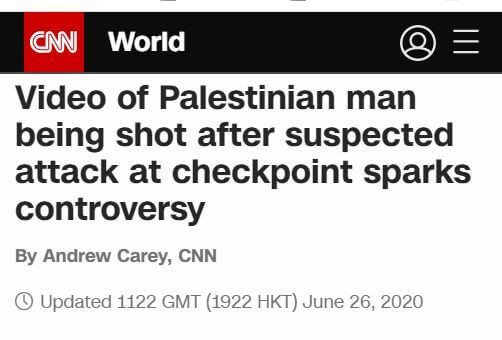In response to accusations that Israeli forces shot and killed a Palestinian without justification, Israel Border Police released security footage from the suspected car-ramming attack in the West Bank. On June 26, CNN ran with this story, opening the network’s report of the incident with this headline:

Controversial? See the video and judge for yourself.
Clear Act of Violence
Check out the video of the incident and this is what you’ll see: a car being driven by Ahmad Moustafa Erekat approaches a checkpoint in Abu Dis, near Jerusalem. He abruptly accelerates and turns toward a group of police. His car then rams into a female officer — who is knocked into the air — before colliding with a booth and coming to a stop.
The attacker stopped, aimed, and sped at the border officers while ignoring their warnings. He then swiftly exited the vehicle, possibly in a bid to attack other soldiers. No doubt about it: Ahmad Erekat, nephew of senior Palestinian official Saeb Erekat, was caught on tape attempting to perpetrate a clear act of violence.
Note how Erekat slowly maneuvered his car to give it more room before quickly accelerating into the checkpoint tower. This video testimony clearly contradicts the assertion by members of Erekat’s family that he was simply rushing to pick up his sister and mother ahead of a family wedding later that evening, and lost control of the vehicle. No, Erekat’s actions were intentional.
Yet CNN’s headline emphasizes the Israeli response – ‘man being shot’ – though most of the video documenting the incident is of Erekat attempting to ram his car. A bit misleading, no?
Join the fight for Israel’s fair coverage in the news
When you sign up for email updates from HonestReporting, you will receive
Sign up for our Newsletter:
Join the fight for Israel’s fair coverage in the news
Was the Suspect Really a Threat, Or Were Israeli Forces Trigger-Happy?
CNN reports on the seemingly problematic fact that the image of Ahmad Erekat in the video is blurred:
The final seconds of the 12-second clip shows Ahmad Erekat getting out of the car, and an officer shooting him. His figure exiting the car was blurred before the video’s release to the public, making it impossible to tell whether he presented a threat or if he had his hands in the air as he was shot dead.
Someone reading this piece could easily conclude that the incident was a one-off, and that Israel Border Police officers may well have overreacted to a harried young man rushing to a wedding – with tragic consequences. What’s missing here is any sense of historical context. In fact, Israeli security forces have become all too familiar with the pattern of a suspect ramming a car, exiting it, and then proceeding to stab at people.
Since 2015, there have been over 80 vehicular (ramming) attacks in Israel. In April, a member of Hamas was suspected of engaging in a car-ramming attack at the Abu Dis checkpoint. The suspect, Ibrahim Halassa, 25, then stabbed and moderately injured an Israeli officer before being shot and killed. According to counter-terrorism expert Daveed Gartenstein-Ross, terrorists began using vehicles as weapons partly because, “the security barrier is fairly effective, which makes it hard to get bombs into the country.”
By rushing out of the car immediately after ramming his car, Erekat gave the soldiers a strong indication that he intended to continue his attack by trying to stab someone else in the vicinity. As such, the Border Police officers on the scene had no choice but to act as swiftly as they did.
Related Reading: Why Headlines Matter
UK Minister: Erekat’s Death ‘Needless’
CNN then cites Alistair Burt, a former UK minister with responsibility for the Middle East. Before the video was released, Burt was troubled by the prospect that Erekat’s death was “needless.” But even after the footage was released Burt doesn’t condemn Erekat’s actions, defaulting to a vague plea for an end to all violence:
There will be no consensus on this, just as there rarely is in the deaths of many. I have spoken for many years about the agony of young Israelis and Palestinians, who instead of growing up together confront each other across barbed wire and wall. This is no future for them.
For a bit more clarity on the issue, some thoughts from former Israeli Ambassador to the United Nations Ron Prosor are illuminating. Ambassador Prosor wrote a letter to the UN in response to yet another car ramming attack, during which a Palestinian attacker intentionally plowed his car into three IDF soldiers. Here’s an excerpt:
While Hamas rushed to praise today’s attack, the international community has yet to even address the attacks from earlier this week. I have not heard any condemnation of this terror attack, or the previous attacks, from the Security Council.
As I have written to you previously, terror is terror, no matter where it takes place, or who is harmed. The people of Israel deserve the same level of concern and empathy as any other people in the world.
By referring to the actions of Israel Border Police officers as ‘controversial,’ CNN crosses a journalistic red line from reporting to advocacy. And by failing to provide proper historical context of the car ramming epidemic in Israel, the network makes it all too easy to conclude that the incident in question may have been unjustified.
Don’t CNN readers deserve to be given the facts, and then be allowed to reach their own conclusions without being hampered by agenda-driven journalism?
Actually, most of the video is of a Palestinian man ramming his car into Israeli soldiers. Why the misleading headline, @CNN? pic.twitter.com/VUKKZGairt
— HonestReporting (@HonestReporting) June 28, 2020
Enjoyed reading this article? Follow the HonestReporting page on Facebook to read more articles debunking news bias and smears, as well as others explaining Israel’s history, politics, and international affairs. Click here to learn more!


